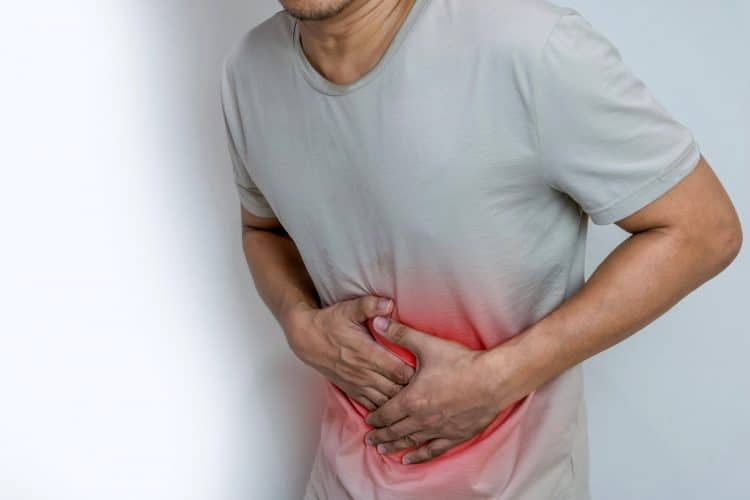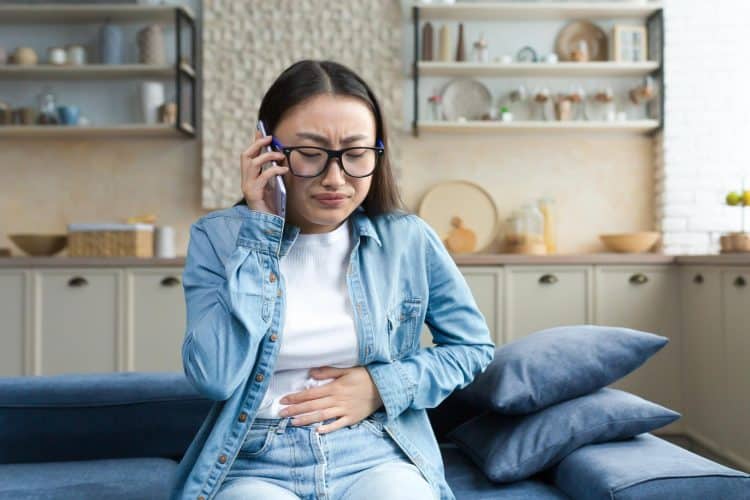Although fasting has many pros, after-effects like dehydration, diarrhea, constipation, and other gastrointestinal problems can be quite discouraging. These issues are common reactions while adapting to a new eating schedule.
Unlike constipation which is caused due to a loss of fluids from the body, diarrhea, in most instances, is not a direct result of fasting. However, lactose intolerance, thyroid disorder, or consuming certain medications while fasting can be the real culprits behind an upset stomach.
If you are facing similar issues, looking for answers, or wish to explore more about fasting-caused diarrhea, this article has you covered.
[sc name=”style-blue-box” ]
Note: The content on Fitness Volt is for informative purposes only and should not be taken as medical advice to diagnose, prevent, and/or treat health problems. If you’re suffering from a health issue, are pregnant, or are under 18 years old, you should consult your physician before starting any new supplement, nutrition, or fitness routine.
[/sc]
What is Diarrhea?
It is a gastrointestinal disorder where people pass loose or watery stools at a higher frequency than their normal bowel movements. [1]
There could be many reasons behind diarrhea while fasting; however, it is usually short-lived and sometimes makes you lose weight. Notably, weight loss might not be directly linked to diarrhea. Prolonged illness can lead to water weight loss in some cases.

Diarrhea Symptoms
Loose, watery stools are the first sign of diarrhea. If symptoms last longer, you may need medical attention. However, a little queasy stomach is not unknown after breaking a fast. While common, experts believe that fasting-related diarrhea is preventable.
Is Diarrhea Life-Threatening?
Diarrhea can be very unpleasant, but it is not usually life-threatening as a side effect of fasting. You should watch out for symptoms such as bloody stools, pain or swelling around the bowel, pain during bowel movement, or extreme stomach pain. If symptoms don’t subside and last for several days, it is best to visit a doctor and get immediate treatment.
Is Diarrhea After Fasting Normal?
The human body is sensitive to any form of change. Fasting can dehydrate your body, especially if you are physically active or exposed to a warm environment. Mostly, suboptimal fasting practices or food choices are the root cause of fasting-related diarrhea.
Why Do People Get Diarrhea After Fasting?

People with irritable bowel syndrome are particularly prone to fasting-related diarrhea [2]. In healthy individuals, the primary reason behind diarrhea after fasting is not the practice itself but poor food choices. You should make a comprehensive diet plan for your eating window and after you have broken your fast to avoid diarrhea or any such stomach-related problems. Here are some common reasons for diarrhea:
- Breaking fast with high-fat foods: High-fat foods are tuff on your stomach after a fast. You should return to your normal eating routine by consuming small portions at frequent intervals.
- Food poisoning: Eat fresh and hygienic food to avoid food poisoning.
- Lactose intolerance: Sometimes drinking milk post-fasting can cause diarrhea. People who cannot digest lactose can get nausea, bloating, or diarrhea after fasting.
- Other food allergies: You may be allergic to some foods, which could get worse when these foods are consumed on an empty stomach, causing diarrhea.
- Excessive caffeine consumption: Excessive intake of unsweetened tea, coffee, or other caffeinated beverages post-fasting can lead to a host of problems like increased heart rate, nausea, and diarrhea.
- Consuming zero-calorie sweeteners: Long-term use of zero-calorie sweeteners can cause various health issues like weight gain, type 2 diabetes, obesity, cancer, and other health hazards.
What is the Cure for Diarrhea?
Here are a couple of cures for diarrhea:
1. Home Remedies
If you are experiencing diarrhea after a fast, given below are a few natural and safe home remedies that have no side effects:
- Water contains minerals; drink plenty of water if you get diarrhea after fasting.
- Avoid caffeinated and sugary beverages.
- Opt for diluted unsweetened juice, herbal tea, or electrolyte replacement drinks.
- Eat more foods with soluble fiber, such as black beans, brussels sprouts, sweet potatoes, kidney beans, etc.
- Add foods rich in potassium and sodium to your diet. You can also take potassium supplements after consulting your doctor.
You can try these home remedies to cure your diarrhea. However, if it persists, you should immediately switch to medications.

2. Medications
You can always switch to over-the-counter medications if home remedies don’t work. However, you should only use them after consulting your doctor. Some common medicines that can control diarrhea include:
- Loperamide (Imodium)
- Bismuth subsalicylate (Pepto-Bismol)
How to Avoid Diarrhea After Fasting?
Diarrhea is treatable, and if you are experiencing fasting-related diarrhea, you might be able to treat it naturally without any medical intervention. Often diarrhea leads to dehydration, dizziness, weakness, and other symptoms. If your symptoms are severe, it might be best to pause fasting and return to your normal diet. Here are a few handy tips that can help you treat post-fasting diarrhea:
1. Break Your Fast With Light Meals
No fasting method leads to diarrhea; instead, it usually results from breaking a fast inappropriately. A fasting window slows down your digestive system and makes your stomach sensitive to food. So, if you break your fast with big meals, it could become difficult for your stomach.

Breaking your fast with fatty or spicy food may interfere with your digestive process, causing diarrhea. You should eat simple and low-fat food that is easy on your stomach. Fruits, low-fat veggies, smoothies, etc., make a good choice.
[Related: The 21 Day Smoothie Diet: Is it a Healthy Weight Loss Diet?]
2. Drink Plenty of Fluids
Make sure to keep yourself well-hydrated throughout the fasting period. You can choose plain water or calorie-free natural electrolytes such as coconut water.
Calorie-free or unsweetened drinks like water can help you rehydrate and compensate for the loss of fluids. You can omit caffeinated and carbonated beverages and replace them with electrolyte-rich drinks, diluted unsweetened juices, and herbal teas.
3. Consume a Low-Fiber Diet
A fiber-rich diet can improve your gut health, but when dealing with diarrhea, you should switch to a high-starch and low-fiber diet. Foods rich in potassium, proteins, and pectin can help during diarrhea. Steamed veggies, fruits, yogurt, eggs, etc., make a good choice. [3]
4. Boost Your Gut Health
Gastrointestinal or bowel issues can be improved with holistic gut health care. You should consider including probiotics and fiber-rich food in your diet for a healthier gut. You can also check with your doctor for possibilities of cleansing your colon as a detoxification process, as it can improve your gut microbiota.
During diarrhea, you tend to lose a lot of healthy gut bacteria. Replenishing them is essential for sustaining good digestive health. Curd, yogurt, and other food rich in probiotics can be used to improve your overall gut health.
5. Keep Your Meals Small
Too much food in your gastrointestinal tract can worsen your health, especially when you suffer from diarrhea. However, it is essential that you get enough nutrition for energy throughout the day. You should eat frequent small meals in your normal routine.
6. Don’t Take Supplements on an Empty Stomach
It is better to abstain from too many supplements during fasting, especially until the body has adjusted to your new fasting routine. While electrolytes can prevent dehydration during a fast, excessive consumption can again cause diarrhea, especially when taken on an empty stomach.
As the body tries to maintain a balance between the fluids inside and outside your cells, consumption of excessive electrolytes can cause you to excrete them through your intestinal tract, causing diarrhea. [4]
Consuming fat-burning supplements during a fast can also cause diarrhea, especially those rich in magnesium. If you experience loose stool in your fasted state, drinking plenty of fluids would be a good idea.
Do You Need To See a Doctor?
Usually, diarrhea associated with fasting does not continue for long and is cured with a balanced and nutritious diet and some simple home remedies. However, if it aggravates and you experience severe symptoms such as extreme fatigue, abdominal pain, high fever, or bloody stools, you must consult a health professional before taking any over-the-counter medicine.

You can watch out for symptoms of gastric dysmotility, where muscles of the gastric system become impaired. Breastfeeding women should be particularly cautious of acute hyponatremia after a fast. [5][6]
Other fasting side effects could include headache, dizziness, lethargy, and mental fog. Such side effects are usually a result of low sodium levels in your body. With insulin levels dropping over some time, the kidneys receive the message to release excess water. Due to this, many people new to fasting might experience the urge to urinate frequently. With your body eliminating excess water, it tends to lose electrolytes that can change its homeostasis. [7]
Electrolytes can also be lost through bowel movements, so people experiencing diarrhea need to replenish it.
Akin to post-fasting diarrhea, you can also experience nausea during a fast. Although it may not be as severe as diarrhea, it can still be unpleasant. Any spicy food, caffeinated products, etc., can irritate your gut lining leading to nausea. Also, excessive physical activity during a fast that results in a rise in your body temperature can make you nauseous.
If you experience any of these symptoms for more than three days without any improvement, you should seek medical help.
FAQs
Should I avoid fasting because of diarrhea?
No. You should not avoid fasting due to a fear of diarrhea. On the other hand, you should understand the dynamics of what causes diarrhea and ways to control it to experience the benefits of fasting and minimize its side effects.
Is fasting bad because it causes diarrhea?
Fasting-related diarrhea can be avoided by following appropriate precautions. You can get numerous benefits from fasting when done the right way.
Besides diarrhea, what are other side effects of intermittent fasting?
You could experience hunger pangs, headaches, light-headedness, dehydration, irritability, low energy, mood swings, fatigue, bad breath, sleep disturbances, and malnutrition while fasting. But all these side effects can be minimized and made bearable with proper planning.
Can eating only once a day cause diarrhea?
Depending on your digestive system and what you choose to eat, a large meal once a day can put pressure on your digestive system to catalyze and absorb a big meal. Hence, it could increase the risk of heartburn or diarrhea.
Can eating too fast cause diarrhea?
It is essential to be mindful of what you feed yourself post-fasting and how you eat. Some studies reveal that eating too fast can cause endoscopic erosive gastritis. [8]
What could be the reasons behind black stool and loose motions after a 48-hour fast?
Black stool is likely due to blood in the upper part of the gastrointestinal tract. You must consult a health professional if you observe blood in your stool, experience swelling around your bowels, or feel pain during your bowel movement after fasting. Diarrhea persisting for several days could be a sign of bacterial or viral infection and must be checked with a doctor.
How does the bad food I ate turn into diarrhea so fast?
If you are allergic to certain foods or eat bad food, it can react the moment it enters your body. So, you should avoid such foods at all costs.
What do you do if you have diarrhea during fasting?
You can increase your water intake to curb the possibility of dehydration. Electrolyte supplementation, bone broth, cucumber water, etc., can help combat diarrhea. It is best to avoid sweetened, carbonated, and caffeinated beverages. Also, avoid giving in to cravings for fatty and spicy food post-fasting to prevent diarrhea.
Why does not eating cause diarrhea?
People with acidic stomachs will likely get diarrhea by not eating as the body tries to expel the accumulated acids.
Learn more about fasting
- 11 Best Intermittent Fasting Books in 2023 (Review and Ranked)
- 7 Day Water Fast: Your Journey to Rejuvenation and Wellness
- 6 Intermittent Fasting Juice Recipes: Sip Your Way to Success with These Tasty Recipes!
- Eat Stop Eat Intermittent Fasting Decoded: Master Your Metabolism & Lose Weight
- Intermittent Fasting for Weight Loss in Men — The Ultimate Guide
- Fat Loss vs. Weight Loss — Explained!
- Fruit Fasting: The Sweet Path to Wellness
- Foods To Avoid While Intermittent Fasting
- Does Cinnamon Break a Fast? Separating Fact from Fiction
- Does Honey Break Your Fast? — Unveiling the Truth
Final Thoughts
Fasting alone cannot cause diarrhea but indicates whether your fasting process and choice of food during eating periods are appropriate. Moreover, it can point you toward any possible underlying health conditions. Pay close attention to the duration of diarrhea and how frequently it occurs so that you can consult a medical professional if necessary. Consumption of an oral rehydration solution in measured quantities can address dehydration caused by diarrhea.
The most obvious ways to deal with fasting-related diarrhea are to stay hydrated and follow a healthy diet by adding more fruits, nuts, seeds, and veggies to your diet.
References
- Woods, Timothy A. “Diarrhea – Clinical Methods – NCBI Bookshelf.” Diarrhea – Clinical Methods – NCBI Bookshelf, 1 Jan. 1990, www.ncbi.nlm.nih.gov/books/NBK414.
- “Fasting and Postprandial Volumes of the Undisturbed Colon: Normal Values and Changes in Diarrhea-predominant Irritable Bowel Syndrome Measured Using Serial MRI – PubMed.” PubMed, 1 Jan. 2014, pubmed.ncbi.nlm.nih.gov/24131490.
- Vanhauwaert, Erika, et al. “Low-Residue and Low-Fiber Diets in Gastrointestinal Disease Management.” PubMed Central (PMC), 10 Nov. 2015
- “Water and Electrolytes – Recommended Dietary Allowances – NCBI Bookshelf.” Water and Electrolytes – Recommended Dietary Allowances – NCBI Bookshelf, 1 Jan. 1989
- Middleton, Stephen J., and Kottekkattu Balan. “Post-prandial Reactive Hypoglycaemia and Diarrhea Caused by Idiopathic Accelerated Gastric Emptying: A Case Report – PMC.” PubMed Central (PMC), 13 May 2011, www.ncbi.nlm.nih.gov/pmc/articles/PMC3113993.
- Rosen, Raphael J., and Andrew S. Bomback. “Acute Hyponatremia After a Religious Fast – PMC.” PubMed Central (PMC), 4 Mar. 2021, www.ncbi.nlm.nih.gov/pmc/articles/PMC8282521.
- Shrimanker, Isha, and Sandeep Bhattarai. “Electrolytes – StatPearls – NCBI Bookshelf.” Electrolytes – StatPearls – NCBI Bookshelf, 26 July 2021
- Kim, Min-Kyung, et al. “Fast Eating Speed Increases the Risk of Endoscopic Erosive Gastritis in Korean Adults – PMC.” PubMed Central (PMC), 20 Nov. 2015


